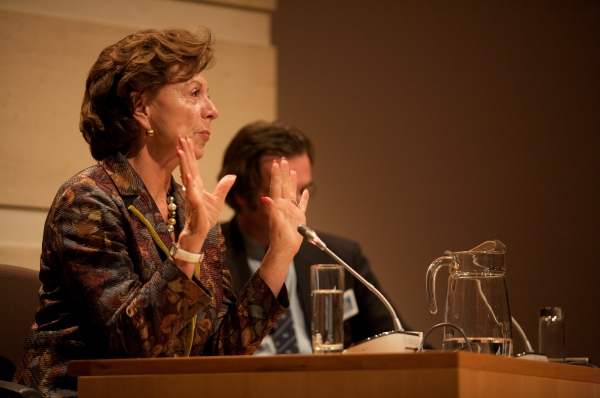Europe needs a modern copyright system
Copyright is out of touch with the realities of the digital environment which is characterised by pervasive sharing and reuse of culture and knowledge. That is why Kennisland advocates for modernisation of the copyright framework in Brussels and the Hague. A modern copyright system needs to provides more room for all individual internet users, public sector institutions, researchers and entrepreneurs and public sector stakeholders and embrace the opportunities offered by the digital revolution.
- Contact
- Paul Keller

In a society in which large parts of the economy are increasingly based on digital services and goods, copyright functions as an important framework for business models, innovation, access to culture and knowledge, and the organisation of education and research. We believe that the current copyright framework does not sufficiently account for the technological progress of the last decade.++UPDATEAt the end of 2018 we have ended our activities in the areas of copyright and cultural heritage. Kennisland has been working on these themes for over a decade. Read what we have done to improve copyright and access to digital heritage. Outdated copyright rules block the development of new possibilities for individuals, public institutions and other public sector stakeholders. This is a result of the fact that there have been no structural changes to copyright legislation in the European (and hence Dutch) system since 2001.
The copyright directive is outdated
The 2001 copyright directive harmonises++EU directivesEU directives are legislative instruments that do not apply directly but need to be implemented in national legislation. They generally contain rules that provide for a maximum of minimum level of legislative interventions. The copyright directive provides a template for the copyright laws of all 28 member states and ensures a minimum level of harmonisation between the different national copyright laws. the exclusive rights of creators++Exclusive rightThe exclusive right of creators to authorise or prohibit reproductions and to authorise or prohibit any communication to the public of their works. and the rights of users of protected works such as educational institutes, end users, cultural heritage institutions or people with a disability. The rights of users are defined in a list of exceptions++ExceptionsThe EU copyright directive (see above) contains a list of 21 optional exceptions to the exclusive rights of the creators. It is up to member states whether they implement these exceptions in their national copyright legislation or not. As a result, citizens do not enjoy the same rights across the European Union. to the exclusive rights of creators. Examples of exceptions in which works can be reused without permission of the rightsholder are private copying, citing works, or the use of protected works in educational institutes.
The list of exceptions to the copyright directive is 13 years old. In the meantime our society has changed dramatically. We now work and communicate digitally, online search engines function as our memory, digital platforms are used in schools, universities make their courses available online for everyone and museums and archives make their collections publicly available.
Even though modernising copyright has been on the agenda for quite a while (both in Brussels and in the Hague), little has changed yet. This is partly due to the intense advocacy efforts of representatives of rights holders, who strongly argue against any additional rights for users.
Rights holders strongly argue against any additional rights for users.
Representing users and public institutions
Together with a number of other organisations, Kennisland represents the point of view of users and public institutions in discussions about copyright reform. We coordinate the working group Copyright of the Dutch cultural heritage institutions and we are a member of the COMMUNIA Association++COMMUNIACOMMUNIA is an international association of organisations that work on strengthening the public domain. KL is one of the founding members. Communia operates by the use of 14 policy recommendations. and Copyright 4 Creativity++C4CCopyright 4 Creativity (C4C) is a coalition of organisations throughout Europe that work towards a more modern and flexible copyright framework. in Brussels.
We believe that the time is now to modernise copyright to ensure that users will get more space to express their creativity, and that public educational and cultural heritage institutions can fully embrace the opportunities offered by the digital environment. A first step in the right direction would be an update++EU consultationSee our reaction to the public consultation of the European Commision on the reform of the European Copyright rules. of the European copyright directive.

Read more
Read more
Read more

